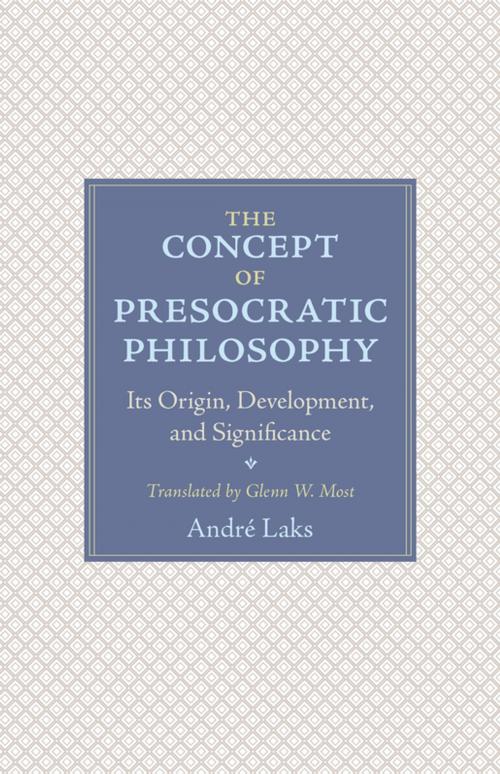The Concept of Presocratic Philosophy
Its Origin, Development, and Significance
Nonfiction, Religion & Spirituality, Philosophy, Ancient, History| Author: | André Laks | ISBN: | 9781400887910 |
| Publisher: | Princeton University Press | Publication: | January 1, 2018 |
| Imprint: | Princeton University Press | Language: | English |
| Author: | André Laks |
| ISBN: | 9781400887910 |
| Publisher: | Princeton University Press |
| Publication: | January 1, 2018 |
| Imprint: | Princeton University Press |
| Language: | English |
When we talk about Presocratic philosophy, we are speaking about the origins of Greek philosophy and Western rationality itself. But what exactly does it mean to talk about “Presocratic philosophy” in the first place? How did early Greek thinkers come to be considered collectively as Presocratic philosophers? In this brief book, André Laks provides a history of the influential idea of Presocratic philosophy, tracing its historical and philosophical significance and consequences, from its ancient antecedents to its full crystallization in the modern period and its continuing effects today.
Laks examines ancient Greek and Roman views about the birth of philosophy before turning to the eighteenth-century emergence of the term “Presocratics” and the debates about it that spanned the nineteenth and twentieth centuries. He analyzes the intellectual circumstances that led to the idea of Presocratic philosophy—and what was and is at stake in the construction of the notion. The book closes by comparing two models of the history of philosophy—the phenomenological, represented by Hans-Georg Gadamer, and the rationalist, represented by Ernst Cassirer—and their implications for Presocratic philosophy, as well as other categories of philosophical history. Other figures discussed include Plato, Aristotle, Cicero, Diogenes Laertius, Schleiermacher, Hegel, Nietzsche, Max Weber, and J.-P. Vernant.
Challenging standard histories of Presocratic philosophy, the book calls for a reconsideration of the conventional story of early Greek philosophy and Western rationality.
When we talk about Presocratic philosophy, we are speaking about the origins of Greek philosophy and Western rationality itself. But what exactly does it mean to talk about “Presocratic philosophy” in the first place? How did early Greek thinkers come to be considered collectively as Presocratic philosophers? In this brief book, André Laks provides a history of the influential idea of Presocratic philosophy, tracing its historical and philosophical significance and consequences, from its ancient antecedents to its full crystallization in the modern period and its continuing effects today.
Laks examines ancient Greek and Roman views about the birth of philosophy before turning to the eighteenth-century emergence of the term “Presocratics” and the debates about it that spanned the nineteenth and twentieth centuries. He analyzes the intellectual circumstances that led to the idea of Presocratic philosophy—and what was and is at stake in the construction of the notion. The book closes by comparing two models of the history of philosophy—the phenomenological, represented by Hans-Georg Gadamer, and the rationalist, represented by Ernst Cassirer—and their implications for Presocratic philosophy, as well as other categories of philosophical history. Other figures discussed include Plato, Aristotle, Cicero, Diogenes Laertius, Schleiermacher, Hegel, Nietzsche, Max Weber, and J.-P. Vernant.
Challenging standard histories of Presocratic philosophy, the book calls for a reconsideration of the conventional story of early Greek philosophy and Western rationality.















